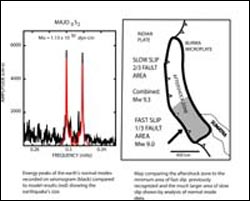
Northwestern University seismologists have determined that the Dec. 26 Sumatra earthquake that set off a deadly tsunami throughout the Indian Ocean was three times larger than originally thought, making it the second largest earthquake ever instrumentally recorded and explaining why the tsunami was so destructive.
By analyzing seismograms from the earthquake, Seth Stein and Emile Okal, both professors of geological sciences in Northwestern’s Weinberg College of Arts and Science
While nothing can undo the devastation from the massive tsunami that recently struck in Southeast Asia, lives can be saved in the future if scientists can rapidly characterize the earthquakes that cause tsunami. The quick response of the Global Seismographic Network to the 26 December 2004 Sumatra- Andaman earthquake offers clear opportunities to reduce the amount of time before an emergency response and assistance could be dispatched to a similarly afflicted area in the future.
The British Geological Survey (BGS) announced today that they will start sending scientists to the affected regions next Monday. The scientists will help with the rebuilding process and address immediate problems such as contaminated freshwater supplies.
Following a symposium in Thailand (31 January –1 February), David Ovadia, head of the BGS international team, said, ‘What we got out of the conference was a consolidated, agreed list of scientific activities that the affected countr
Discovery could be used in design of robotic explorers
A study led by Princeton biologists has revealed a remarkably simple mechanism that allows flocking birds, schooling fish or running herds to travel in unison without any recognized leaders or signaling system.
The finding, published in the Feb. 3 issue of Nature, helps settle age-old questions about how animals coordinate their actions. Previously, scientists had looked for subtle signals or other explicit systems that
The single-celled organisms of the world’s oceans are immensely diverse. For the ‘International Census of Marine Microbes’ scientists are going to track down knowledge on the diversity and distribution of these micro-organisms and their viruses. The budget? 900,000 dollars of the Sloan Foundation in New York to start with. On February 7 and 8, the steering committee from America and the Netherlands will gather for the first time.
Goal of the International Census of Marine Microb
Significant advances in university research and other studies in the past two years are pointing toward Oregon as the possible epicenter of wave energy development in the United States.
This may lead to a major initiative to expand a technology that is now in its engineering infancy, and tap the constant heave of the oceans for a new era of clean, affordable and renewable electrical power. Electrical engineers at Oregon State University have pioneered the development of techno